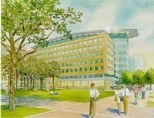CAMBRIDGE, Mass., Jan. 12, 2001 -- The Massachusetts Institute of Technology has signed a contract to purchase Technology Square in Cambridge, MA from Beacon Capital Partners, Inc., Beacon and MIT announced jointly today. The closing is expected to take place in early February. Terms of the transaction were not disclosed.
The purchase will include Technology Square's three existing buildings totaling approximately 541,000 square feet and four new commercial office buildings totaling approximately 617,000 square feet. The four new buildings are currently under construction, with the first (175,000 square feet) expected to be ready for occupancy in Spring 2001.
Beacon Capital Partners Inc. is a real estate investment company formed in January 1998 by Alan M. Leventhal, Chairman and CEO, and Lionel P. Fortin, President and COO. The company is based in Boston and has a regional office in Los Angeles.
Beacon has owned Technology Square since June 1998 when it was purchased from the Prudential Insurance Company of America. Under Beacon's ownership, two of the original buildings have been fully renovated to accommodate the technology community. Tenants of the complex include Akamai Technologies, Inc., Forrester Research, Inc., and the MIT Laboratory for Computer Science, among others. Beacon's portfolio also included the adjacent 475,000 square feet Draper Building that was sold in April 2000 to the tenant, the Charles Stark Draper Laboratory Inc.
Technology Square will be completed under Beacon's plans which the City approved in July 1999. The plans include redesigned common areas and the new office buildings.
Allan Bufferd, MIT Treasurer, stated: "This is an investment in the City of Cambridge. MIT intends to hold Technology Square in its commercial tax-paying portfolio for the foreseeable future. The Institute has allocated a significant portion of its private endowment and other funds towards investments in non-campus commercial properties in Cambridge for more than 20 years."
MIT's other commercial tax-paying investments include 640 Memorial Drive, One Broadway, and the current rehabilitation of 28 Osborn Street. MIT also owns the land on which Forest City Enterprises has developed University Park at MIT, a mixed-use development featuring affordable and market-rate housing, a hotel, parkland and research, office and retail space. Collectively, these projects have increased the value of the City's commercial property base by approximately $700 million.
John Curry, MIT Executive Vice President, commented: "MIT recognizes its special role in Cambridge. We are committed to continuing our work with the City government and Cambridge residents as a responsible member of the community."
Following the request of Cambridge Mayor Edward Crane, MIT and Cabot Cabot & Forbes in the 1960s took on the urban redevelopment task of converting a former soap factory site into Technology Square, one of Cambridge's first large-scale commercial real estate developments. MIT remained involved in Technology Square until selling its interest in 1973.
MIT's impact on the Cambridge economy was documented in a 1997 economic study, MIT: The Impact of Innovation. MIT students and faculty have founded 150 companies in Cambridge, generating 14,000 jobs, $700 million in sales, as well as millions of dollars in real estate taxes on commercial and residential property and in sales taxes.
OBLIGATORY FOR PUBLIC COMPANIES : Certain matters discussed in this press release may constitute forward-looking statements within the meaning of the Federal securities law. Although Beacon Capital Partners, Inc. and MIT believe that the expectations reflected in such forward-looking statements are based upon reasonable assumptions, neither the Company nor MIT can give assurance that their expectations will be achieved. Factors that could cause actual results to differ materially from current expectations include general economic conditions, local real estate conditions, timely release of occupied square footage upon expiration, interest rates, availability of equity and debt financing and other risks detailed from time to time in the Company's filings with the Securities and Exchange Commission or in other publicly available information.








